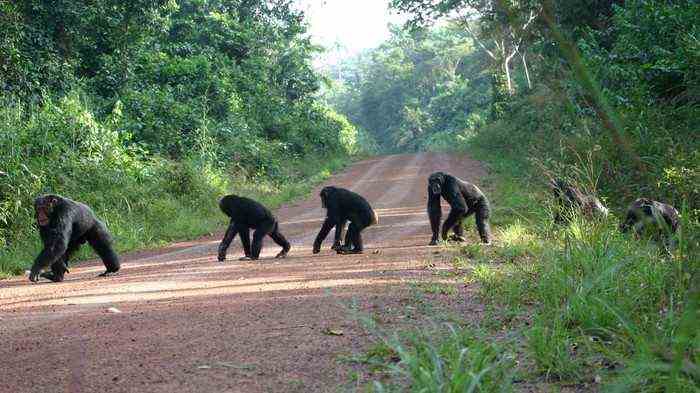Chimpanzees were once widespread in western Africa, but over the past twenty years their numbers have decreased by 80 percent. It is estimated that there are only around 35,000 West African chimpanzees left in the world. There are many reasons for the dramatic decline, but almost all of them have to do with humans. A team led by the biologist Balint Andrasi from the UK University of Exeter has now added another to the long list of causes that plague chimpanzees and endanger their survival: the construction of roads.
“This is the first time that the impact of road construction has been examined using an analytical approach, and the result is shocking,” says British conservationist Kimberley Hockings, who contributed to the study in the science journal Conservation letters was involved. The study shows that chimpanzees not only avoid streets and are therefore less likely to be found in their vicinity than elsewhere, but that the paths also massively reduce the number of primates.
To find out, the scientists combined data on the population density of West African chimpanzees in their range in Ghana, Guinea, Guinea-Bissau, Ivory Coast, Liberia, Mali, Senegal and Sierra Leone and combined them with information on the road network in these countries.
The damage was still detectable within a radius of more than 17 kilometers
The negative influence of large roads was therefore still detectable within a radius of 17.2 kilometers, that of small roads within a radius of 5.4 kilometers. This means that only around four percent of the range of the West African chimpanzee are not affected, the scientists write. “The impact of building infrastructure is much bigger than I expected, and that’s really a cause for concern,” says Hockings. The chimpanzees seem to react particularly sensitively to the infrastructure, with other mammal species the harmful consequences of large roads can only be detected within a radius of five kilometers.
The researchers can only guess why this is the case. For chimpanzees, the direct risk posed by roads for all wild animals, namely being run over, is comparatively low. The indirect consequences of road construction are probably much more dramatic. Roads make previously untouched regions accessible to human activities such as mining or agriculture. As a consequence, forests in which the primates live are often cut down. More than four fifths of the forest in West Africa has been lost in this way since the beginning of the millennium.
Hunters also have it easier in an area accessible by roads. Chimpanzees are strictly protected and are officially not allowed to be caught, traded or killed. Nonetheless, the sale of so-called bush meat is flourishing, which is no longer only consumed by local people, but is also transported over long distances to the cities and sold there. In addition, chimpanzees reproduce slowly. Females do not have offspring for the first time until they are around 14 years old. It is almost always a single cub that is suckled for up to five years.
It is clear to the authors that, in view of the rapidly growing population in West Africa, it is completely illusory to ban the further expansion of the infrastructure. In their opinion, it is all the more important to at least tighten the controls along the roads and thus make it more difficult to trade and hunt chimpanzees.

